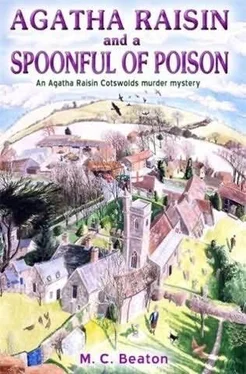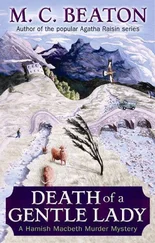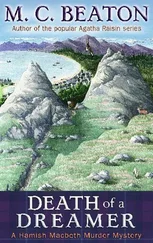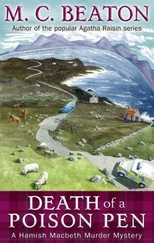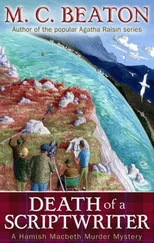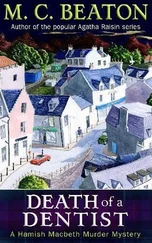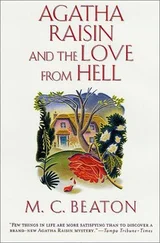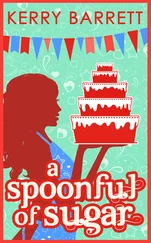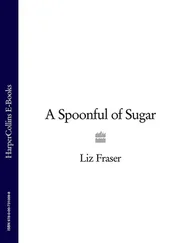Toni wondered whether to go round to one of the discos that evening to dance the memory of that opera out of her head. But instead, she got into her car and headed for Carsely.
Agatha was rummaging in her deep freeze to see if she could unearth something for dinner. Most of the packets were frosted over and she scraped busily at some of them, trying to make out what they were. The doorbell rang. Agatha brightened. She belonged to that generation of women who still considered it a sign of failure to be alone on a Saturday night.
“Oh, it’s you, Toni,” she said on opening the door. “Come in. What’s up?”
“Something’s bothering me.”
“Well, come in. Have you eaten?”
“Not yet.”
“Maybe we’ll go to the pub. I keep throwing stuff into the freezer and then I can never figure out what the stuff is. Yes, let’s go to the pub and get a plateful of comforting cholesterol and you can tell me about it.”
“Oh, they’ve got salads now,” said Agatha, when they were seated in the pub. “Maybe… maybe not. Comfort food is what we need. What about steak and kidney pie and new potatoes?”
“Sounds good,” said Toni.
“That’s a very smart suit,” commented Agatha, “but not like the things you usually wear. Sort of thing one wears for a job interview.” Agatha’s small eyes bored into Toni’s face. “Not looking for another job, are you?”
“It’s not that. Harry took me to the opera.”
“This I must hear. Wait until I order the food at the bar.” When Agatha came back after placing the order, she said, “So what happened? I didn’t know you were seeing Harry.”
“I wasn’t, really. Not until today, that is. He had been texting me, telling me what music to listen to and what books to read.”
“Why?”
“He was trying to improve my mind.”
“Cheeky thing to do.”
Toni sighed. “I thought my mind needed improving. I’m tired of this limbo feeling. You know, not really belonging anywhere.”
“So what was the opera? I saw Carmen once. Great fun.”
“It was by Prokofiev- Lady Macbeth of Minsk. I made an awful fool of myself. I didn’t know what was happening at the beginning, the music sounded so weird, so I said, ‘Is this it?’ and it turned out to be the overture.”
“Maybe we should ask Mrs. Bloxby,” said Agatha. “I’m hardly the person to ask. Most of my life has been work, work, work. I can’t understand Harry. Did he try to make love to you?”
“Never.”
“I thought I knew that young man inside out, but when it comes to romance, I’m the world’s greatest loser,” said Agatha. “We’ll have our food and then take a walk along to the vicarage. I’ve been thinking and thinking about that Comfrey Magna business. The police have more or less given up because they’ve come to the conclusion that it was a prank that went wrong. Somehow, I don’t like to leave it.”
“We could go there tomorrow,” suggested Toni. “Now things have quieted down, people might be readier to talk. How’s Charles?”
“Okay, I think. He is infuriating. I would have expected him to turn up when he heard all that scandal about Jimmy Wilson. Maybe he’s on holiday. No, come to think of it, he’s just behaving like his usual selfish self.”
After they had eaten steak and kidney pie, followed by apple pie and custard, Agatha ordered two coffees, took out a packet of cigarettes and lit one up. John Fletcher, the barman, came hurrying over. “Put that damn thing out, Agatha. The smoking ban’s started and you’ll get me fined.”
“Stalinist bureaucrats,” grumbled Agatha. She saw for the first time that there was no ashtray on the table and handed the cigarette to John, who hurried off with it, holding it at arm’s length as if it were a small stick of dynamite.
As they approached the vicarage, Agatha felt guiltily that they should have phoned first. Quite a number of people in the village took their troubles to Mrs. Bloxby, just as if the vicar’s wife should be always there as a sort of personal therapist.
“We should have phoned,” said Agatha. “I always make the mistake of just dropping in.”
“Phone now,” said Toni.
“We’re practically on the doorstep.”
“Phone anyway.”
Agatha fished her mobile out of her bag. She had never learned how to store important numbers and so, instead of pressing a convenient button, she dialled the whole number.
“It’s Mrs. Raisin here,” said Agatha. “I’m with Miss Gilmour. We would like your advice.”
Toni waited. Then she heard Agatha say, “We’re actually practically on your doorstep… You’re sure? Great.”
The door opened as they approached. This must be what the fortunate feel like, coming home, thought Toni suddenly, looking at the slim figure of the vicar’s wife with her gentle smile.
“It’s quite a nice evening,” said Mrs. Bloxby. “I’m sure you would rather sit in the garden and have a cigarette, Mrs. Raisin.”
“Great. Just so long as one of the army of British snoops doesn’t leap out from behind a gravestone in the churchyard.”
“You’re all right outside.” Mrs. Bloxby led the way. “Would you like something to drink? Coffee?”
Toni shook her heard and Agatha said, “No, we’re fine.”
When they were seated under a pale green evening sky, Mrs. Bloxby asked, “Do you want my advice about anything to do with Comfrey Magna?”
“No, it’s not that. But what about Comfrey Magna?”
“I just wondered how that case was going.”
“Not anywhere at the moment,” sighed Agatha. “The fact is, with all the scandal about Jimmy, we’ve all been working like beavers to clear up as many of the cases on our books as possible. I thought the shame of having someone like Jimmy as a detective would have ruined the agency, but it doesn’t seem to have.”
“So what do you want advice on?”
“It’s Toni’s problem. Tell her, Toni.”
Toni gave her a full account, ending up with describing her experiences at the opera, meeting Harry’s friends before it and his English teacher during the interval. “His English teacher even asked me out,” she said, ‘but then his wife joined us and she didn’t look very happy. Harry had told me he had to go straight back to Cambridge after the show, so I shook hands with him and ran off.”
“So I gather there was nothing romantic in your friendship,” said Mrs. Bloxby.
“Nothing at all. He didn’t seem interested in that side of things. Mind you, this was the first date I ever had with him apart from that trip to Comfrey Magna. But I guess it wasn’t a real date.”
“I am no music expert,” said Mrs. Bloxby, “but I should think that particular work would be quite difficult for someone to enjoy who had not heard a great deal of Prokofiev’s other music. I think Harry got carried away with the idea of being a sort of tutor. I am sure his friends found you very attractive, not to mention that English teacher. He will now see you in a new light. If he falls in love with you, would that trouble you?”
Toni bent her fair head. I wonder if I once had that bloom, that innocence, thought Agatha sadly.
Toni at last gave a reluctant laugh. “My friend, Sharon, said he was trying to make me over. She warned me against him. He made me feel silly and stupid and I don’t think I’ll ever forget that.”
“Someone will come along for you when you least expect it,” said Mrs. Bloxby. “But remember-you are now eighteen, are you not? Yes. Remember that the person you love at eighteen will probably not be the person you would love when you are, say, twenty-five. Mrs. Raisin knows you are a very clever girl. Reading good books and listening to classical music is a grand thing, but in your own time and at your own pace. There is one odd thing. The university term at Cambridge finished for the summer on June fifteenth. What is Harry still doing there?”
Читать дальше
